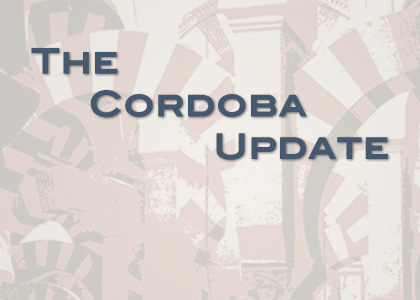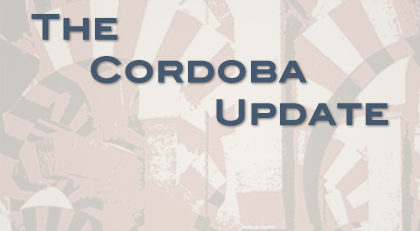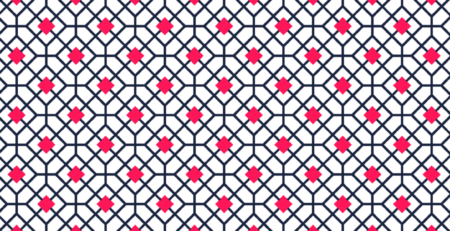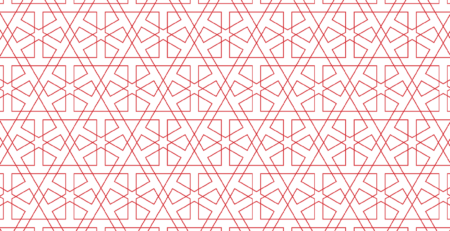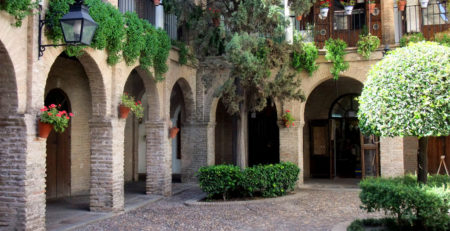The Cordoba Update 19/2016
|
The bi-weekly CORDOBA UPDATE is the product of continuous monitoring work, carried out by the Cordoba Foundation of Geneva team. By analysing and reporting on key events and trends in the Foundation’s areas of interest, we aim to draw readers’ attention to pertinent developments in North Africa, the Sahel, West Asia and Europe, which are not always covered in ‘mainstream’ media. In addition to sharing news from these four regions, the Cordoba Update is an opportunity for the Foundation to provide regular updates on its publications, events and other developments. In line with the programmes and projects funded by partners of the Cordoba Foundation of Geneva, updates and information are included under the following themes:
For questions and/or feedback regarding the content and form of the Cordoba Update, please contact Sarah Franck: sarah.franck@cordoue.ch Le CORDOBA UPDATE est un bimensuel qui présente le travail continu de suivi réalisé par l’équipe de la Fondation Cordoue de Genève. Par l’analyse des événements et tendances qui concernent les domaines d’intérêt de la Fondation, nous visons à attirer l’attention de nos lecteurs sur les développements pertinents en Afrique du Nord, dans le Sahel, en Asie de l’Ouest et en Europe, une actualité qui n’est pas toujours couverte dans les médias dits ‘traditionnels’. Outre le partage de l’actualité de ces quatre régions, le « Cordoba Update » est un moyen pour la Fondation de fournir des mises à jour régulières sur ses publications, événements et autres développements. En accord avec les programmes et projets financés par les partenaires de la Fondation Cordoue de Genève, les mises à jour et informations concernent les thèmes suivants :
Pour des questions et / ou des commentaires concernant le contenu et la forme du Cordoba Update, veuillez contacter Sarah Franck : sarah.franck@cordoue.ch |
EVENEMENTS / EVENTS
La FCG participe à la Geneva Peace Week, 07.11.16
Dans le cadre de la Geneva Peace Week la FCG a participé à un atelier intitulé « Dialogue et Médiation en Afrique du Nord: expériences de terrain ». La FCG a présenté le projet de médiation entre des féministes islamistes et séculières marocaines pour l’amélioration de la condition de la femme.
Lien pour plus d’informations :http://www.genevapeaceweek.ch/node/155
La FCG organise le lancement du livre de François Burgat à la Maison de la paix, 07.11.16
La FCG a organisé la présentation du nouvel ouvrage de François Burgat, Comprendre l’Islam Politique : une trajectoire de recherche sur l’altérité islamiste 1973-2016, paru à la Découverte en octobre 2016.
François Burgat est un spécialiste français du Monde Arabe reconnu dans son pays et à l’étranger. Son livre a reçu un vif succès dont le second tirage a été effectué seulement trois semaines après une première parution.
Lien pour plus d’informations :http://www.editionsladecouverte.fr/catalogue/index-Comprendre_l_islam_politique
ISLAMIST-SECULAR RELATIONS / RELATIONS ENTRE SÉCULIERS ET ISLAMISTES
No contribution on this topic
TRANSITION AND POLITICAL PARTICIPATION / TRANSITION ET PARTICIPATION POLITIQUE
Tunisia, 04.11.2016: Tunisia’s Delicate Balancing Act with Saudi Arabia
Two months only after his appointment as minister of religious affairs Abdeljalil Ben Salem was dismissed following a polemic at a hearing at the Tunisian parliament. Answering a question from a leftist Popular Front MP about Wahhabism and its links to terrorist groups, Ben Salem said that on two occasions had advised Saudi diplomats “to reform their school of thought because historically terrorism came from there”, and added “this thinking and school of thought … could only breed extremism.” The statement cost Ben Salem his post but has also caused a diplomatic embarrassment for Youssef Chahed’s government. Tunisian public opinion has been split on the sacking of the Ben Salem. Some news outlets announced “Saudi Arabia Sacks the Minister of Religious Affairs”.
Ben Salem’s statement left political parties in a dilemma. While what he said was music to the ears of the FP and other secularist parties, they nonetheless did not defend him publicly, for the simple reason that his nomination in the coalition government was backed by Ennahdha, although he is not officially a member of the movement. Ennahdha itself remained silent, since Ghannouchi did not want to disrupt his efforts to mend bridges with Riyadh. There are also the economic interests of Saudi Arabia and direct investment in Tunisia to consider. Even the most vocal secularist political, cultural and economic elites in Tunis observe a deafening silence when it comes to Gulf money and investment in the Tunisian economy—investment that it desperately needs. This episode reminded Tunisians of an exchange of letters between Najdi scholar Muhammad ibn Abd al-Wahhab (1703-1792), and Zeitouna Mosque scholar Omar Mahdjoub (1724-1807). At the turn of the 18th C. Ibn Abd al-Wahhab sent a letter to Hamouda Bacha, Bey of Tunisia (1782-1814), calling him to embrace his thought. The Bey sought the Zeitouna scholars’ advice for a response to the letter. Zeitouna produced a historic religious argument refuting the claims and foundations of Ibn Abd al-Wahhab’s thought. That exchange together with the works of Scholar Tahar Ben Achour (1879-1973), and others, established Zeitouna’s scholarly independence as a guardian of Maliki doctrine jurisprudence in the region.
Links for more information:
http://www.rfi.fr/afrique/20161104-tunisie-ministre-affaires-religieuses
http://www.huffpostmaghreb.com/farhat-othman/dessous-et-retombees
http://www.investir-en-tunisie.net/fr/index.php/2016/01/02/larabie-saoudite
http://daikiri.over-blog.com/article-81887534(Arabic Document: Response of Zeitouna Ulama to Muhammad ibn Abd al-Wahhab)
http://nawaat.org/portail/2016/11/04
Egypt, 01-4.11.2016: Egypt free floats its currency & raises fuel prices
On Thursday, 3 November 2016, Egypt’s central bank floated its tightly controlled currency, in a step that aims to draw foreign capital back to the country but risks pushing the price of goods out of reach for ordinary Egyptians. Hours after floating the exchange rate, Egypt raised fuel prices for the second time since the start of a fiscal reform program in 2014, in an effort to curb a ballooning fiscal deficit. Egyptian Prime Minister Sherif Ismail said that Egypt “did not have the luxury” of postponing urgent economic reforms, speaking a day after the country floated its currency and increased the prices of subsidized fuel. He described Thursday as “an historic day,” adding that all the economic reforms taken are part of a “100 percent Egyptian” programme. In fact, the reforms are part of a move to get the International Monetary Fund board’s approval for a $12 billion loan package to be delivered over three years.
The Wall Street Journal wrote, “Years of political turbulence and an increase in terrorism have hurt Egypt’s main sources of hard foreign currency—tourism and foreign direct investment.” In a statement, the IMF welcomed the currency liberalization, stating that “the flexible exchange rate regime, where the exchange rate is determined by market forces, will improve Egypt’s external competitiveness, support exports and tourism and attract foreign investment.” For economist Natasha Doff, “If Egypt can learn anything from emerging markets that have abandoned control of their currencies, it’s that a half-hearted approach is bound to fail… Whether the move eases the dollar crunch and quashes the black market will depend on how committed the central bank is to staying hands-off when currency swings ensue.”
Links for more information:
http://www.wsj.com/articles/egypt-free-floats-its-currency-devaluing
http://english.ahram.org.eg/NewsContent/1/64/247273/Egypt/Politics-/Egypt
http://www.bloomberg.com/news/articles/2016-11-04/what-not-to-do
http://www.madamasr.com/en/2016/11/03/news/economy/egypt-to-raise-fuel-prices
http://www.nytimes.com/2016/11/04/world/middleeast/egypt-currency-pound
Egypt, 26.10-4.11.2016: Egypt ranked 110th among 113 countries in terms of Rule of Law
Egypt has been ranked 110th among 113 countries by the World Justice Project in terms of Rule of Law experienced by the citizens, positioned only above Afghanistan, Cambodia and Venezuela. Meanwhile, Egypt was elected for a five-year term in the 34-member International Law Commission of the UN General Assembly on Friday, 4 November 2016. Egypt’s foreign ministry said in a statement, “This [election] reflects international confidence in Egyptian competence and expertise, particularly in the field of international law.” Egypt’s stint in the Geneva-based legal body will begin on 1 January 2017 and concludes in 2022.
Security and political situations in Egypt continues to deteriorate. An Egyptian army brigadier general was shot dead Friday, 4 November 2016, in El-Arish in North Sinai. In a statement Friday evening, an army spokesman said that three militants opened fire on Hesham Mahmoud after Friday prayers in front of his house.
In addition, the committee that formed on 1 November 2016 upon the recommendation of the National Youth Conference held in Sharm El-Sheikh in October and tasked with reviewing cases of young detainees, has started its mandate. The initiative comes amid ongoing international criticism of the increasing number of political detainees in Egypt, and was met with skepticism by some activist groups. The appointment of some committee members known for their stated positions against releasing detainees drew severe criticism. The committee includes five pro-government members, including a journalist, Nashwa El-Houfy, who strongly supported the protest law and refused any presidential amnesty. Additionally, the initiative is not the first; presidential promises to release detainees were given in December 2014, January and February 2015, and June 2016, but the only pardon implemented so far is decree no. 368, issued in September 2015, which released 100 prisoners including most of the detainees in the Shura Council and Ittihadiya cases.
Finally, Mohamed Hamama wrote on the Mada Misr website that “the economic activities of Egypt’s Armed Forces is a topic that has been widely discussed in recent months, with analysts speculating as to how much the military economy constitutes of the nation’s G-ross Domestic Product (GDP). Estimates generally range from 5 to 40 percent.” He added that “at a youth conference in Sharm el-Sheikh… Sisi said the economic activities of the Armed Forces constitute between 1 and 1.5 percent of GDP. In the first nine months of the 2015-16 Financial Year, Egypt’s GDP was LE2 trillion, according to the Planning Ministry.” Hamama used Sisi’s calculations to state that “this would put their activities at between LE20 and LE30 billion. The official allocation for defense and national security is LE47 billion in the 2016-2017 national budget, but Sisi acknowledged at the youth conference that the Armed Forces purchases weapons and equipment from their own budget reserves.” Hamama quoted Senior Associate at the Carnegie Middle East Center, Yazid Sayigh, saying “Sisi’s estimations accurately reflect the official book value for the Armed Forces, but he highlights other activities, such as private-sector partnerships for land ownership that he says are unlikely to be included in these calculations.”
Links for more information:
http://data.worldjusticeproject.org
http://english.ahram.org.eg/NewsContent/1/64/247319/Egypt/Politics-/Egypt-wins-fiveyear
http://english.ahram.org.eg/News/246924
http://english.ahram.org.eg/NewsContent/1/64/247209/Egypt/Politics-/The-committee-to-review
http://www.madamasr.com/en/2016/11/02/feature/economy/sisi-says-military-economy
Liban, 07.11.2016 : Présidentielle libanaise
Après plus de deux ans de vide présidentiel, le parlement libanais a finalement élu, le 31 octobre dernier, un nouveau président en la personne de Michel Aoun, 81 ans, fondateur du Courant Patriotique Libre, général à la retraite et ancien chef de l’armée. 29 mois après la démission de Michel Suleiman, le nouveau chef d’état, chrétien maronite suivant la tradition du pays de partage du pouvoir sur des bases confessionnelles, a été choisi avec 83 sur 127 voix en sa faveur pour un mandat de 6 ans. Il aura fallu 45 sessions parlementaires et de nombreuses concessions politiques faites par les différentes factions pour finalement arriver à ce compromis. En effet, c’est le soutien récent apporté par le camp de Saad Hariri et son Courant du Futur qui a fait pencher la balance en faveur de M. Aoun, mais aussi et surtout l’appui inespéré et crucial du Hezbollah dont les membres au parlement boycottaient jusqu’alors les sessions de sélection présidentielle, empêchant ainsi la réunion du quorum nécessaire à une élection, et cela malgré le soutien répété du leader du parti à M. Aoun.
Si ces deux soutiens étaient indispensables à son élection, ils n’en restent pas pour le moins surprenants et inattendus. En effet, ces deux partis politiques sont tout à fait opposés que cela soit du point de vue confessionnel ou politique. Leur rivalité tient aussi de leurs soutiens extérieurs, l’Arabie saoudite et l’Occident pour le premier, l’Iran et la Syrie de Bachar al Assad pour le second. Reste à savoir si ce rapprochement apaisera les tensions politiques bien ancrées dans le paysage libanais et permettra une certaine stabilité politique dans les années à venir.
Néanmoins, une certaine accalmie devrait avoir lieu après la formation du nouveau gouvernement. Tâche qui est revenue quelques jours après l’élection du président et sans trop de suspens, puisque cela faisait partie de l’accord de soutien de son parti, à Saad Hariri, qui a donc été nommé premier ministre. Là aussi sans déroger à la règle d’un premier ministre sunnite, M. Hariri devra faire preuve d’acrobaties politiciennes afin de former, comme il le dit lui-même, « un gouvernement d’unité nationale, basé sur un consensus de toutes les forces politiques, qui surmontera les divisions », principalement sectaires, mais aussi politiques. A noter, que M. Hariri a déjà occupé ce poste de 2009 à 2011, ainsi que son père Rafik Hariri assassiné en 2005.
Liens pour plus d’informations :
http://www.france24.com/fr/20161103-saad-hariri-michel-aoun-premier-ministre
http://www.al-monitor.com/pulse/originals/2016/10/lebanon-president-hariri-aoun
https://www.ft.com/content/988c5958-a05a-11e6-86d5-4e36b35c3550
http://www.naharnet.com/stories/en/219679-hariri-new-government-will-be-formed-soon
https://www.theguardian.com/world/2016/oct/31/michel-aoun-elected-president
http://www.wsj.com/articles/lebanon-leader-selects-prime-minister-in-compromise
Bahrain, 30.11.2016: al-Wefaq Association and the struggles of Bahraini opposition
Bahrain’s main opposition group is appealing in the Court of Cassation against its dissolution and the seizure of its assets. The organization was dissolved by the Bahraini courts on terrorism-related charges in October this year, a decision which drew criticism from members of the international community, including the United Nations Secretary-General. Sheikh Ali Salman, the former secretary-general of Bahrain’s largest political opposition bloc, has been detained since 2014, and convicted on charges of “inciting hatred” and “encouraging violent regime change,” related to a speech calling for political reforms he gave that year. Although he was initially facing a prison sentence of four years, in May 2016 the appeals court more than doubled his jail term. This decision has also been appealed, and the date for the Sheikh’s retrial is set for 4 December 2016.
The crackdown on al-Wefaq is part of a wider trend of silencing opposition in Bahrain since 2011. Since the months-long protests that demanded democratic reforms, hundreds of Bahraini protestors have been arrested and tried in court. Additionally, authorities have stripped at least 261 people of their citizenship since 2012, including the country’s Shia spiritual leader Sheikh Isa Qassim, in what is perceived to be the deliberate targeting of the Shia majority of the Bahraini population.
Links for more information:
http://www.thenational.ae/world/middle-east/bahrain-opposition-group-appeals-against-dissolution
http://www.adhrb.org/2016/10/bahraini-court-orders-retrial-case-sheikh-ali-salman
http://www.alwasatnews.com/news/1177361
https://www.alaraby.co.uk/english/news/2016/11/6/retrial-of-bahrain-opposition-leader-opens
http://www.presstv.ir/Detail/2016/11/06/492385/Bahrain-Salman
http://www.middleeasteye.net/news/bahrain-court-overturns-jail-term-opposition-chief
Iraq, 02.11.2016: Unchecked power, widespread corruption and a roadmap for the future.
As media outlets across the world are fixed on the ongoing military offensive against the Islamic State group in Mosul, Iraq, one commentator has highlighted the importance of the “broken system of the political elite which has kept the same select few in power and has allowed corruption to rise unchecked.” Writing for Middle East Eye, Ahmed Twaij notes that structural violence inherent in the Iraqi political system will continue to jeopardize lasting peace, long after the defeat of this armed insurrection. His article notes the continued presence of a number of divisive individuals in Iraqi politics, and numerous accounts of their involvement in corrupt practices. However, citizens are discouraged from holding the government to account by “various militias who occasionally patrol the streets of Baghdad in their military garb… spreading fear in society to not question their roles.” The relationship between these militias and various politicians is well-known. The result of unchecked power is a lack of confidence in the government, a detachment from the political project of the nation and antipathy towards its lawmakers. Twaij relates a phrase that has become popular among Iraqis: “at least in the time of Saddam we had one oppressor, now we have hundreds.”
The political problems facing Iraq are also played out in the autonomous Kurdish region, prompting the speaker of parliament, Yousif Mohammed, to say that the war against the Islamic State group “should not be the reason to deactivate the democratic process.” The Kurdistan Parliament has been in recess since Mohammed was prevented from entering the regional capital, Erbil in 2015,” due to a long-running dispute over the regional presidency of Masoud Barzani, who has been in power since 2005. Only a handful of Kurdish politicians are known for their activism, while the majority of their constituents see Kurdish MPs as self-serving, seeking “money, privilege and power.”
The absence of the rule of law in Iraq has evidently had deleterious effects on social relations in the country. Recent accounts detail rising mistrust and sectarianism at the micro-level, with reports that several Sunni Muslim families in a mainly Shia district of Baghdad were forcibly removed by armed gangs claiming to represent the community. According to observers, residents of Baghdad fear the resumption of the kinds of violence that were prevalent between 2006 and 2008, when thousands of civilians were killed in sectarian violence.
Despite the prevalence of fear in Iraq, however, Niqash reports that a group comprising a former judge, a professor and some Iraqi students, all originally from Mosul, have created a roadmap for the future of their province, Nineveh, post-Islamic State group. Importantly, the manifesto “advocates for moving away from religion in politics and from Iraq’s standard political quotas, which use sectarian allegiance or ethnicity to decide who will hold senior posts in government.” Both the manifesto writers and Twaij argue that an overhaul of Iraq’s political system is required as, “in a system where the president must be Kurdish, the prime minister Shia and the deputy prime minister Sunni, sectarian divisions are only going to be deepened, adding to the list of failures by the first unelected and inexperienced official to govern over Iraq, Paul Bremer.”
Links for more information:
http://www.middleeasteye.net/columns/now-we-have-hundreds-oppressors-iraqs-false-democracy
http://www.nrttv.com/en/Details.aspx?Jimare=10787
http://www.niqash.org/en/articles/politics/5397/Iraqi-Kurdistan
http://www.niqash.org/en/articles/security/5384/Sectarian-Tensions
http://www.niqash.org/en/articles/politics/5393/Displaced-From-Mosul
RELATIONS BETWEEN COMMUNITIES OF DIFFERENT ETHNIC, CULTURAL AND RELIGIOUS AFFILIATIONS /
RELATIONS ENTRE COMMUNAUTÉS DE DIFFÉRENTES AFFILIATIONS ETHNIQUES, CULTURELLES ET RELIGIEUSES
Suisse, 08.11.16 : Le canton de Vaud dévoile son « expérience laboratoire » dans un contexte tendu questionnant la place de l’islam en Suisse
De nombreuses polémiques questionnant la place de l’islam en Suisse ont été ces derniers temps au cœur de l’actualité et le climat en particulier envers les communautés musulmanes n’est pas des plus favorables. Les récentes polémiques qui ont visé les musulmans suisses comme celle autour de la mosquée de Genève et ses membres fichés S en France, celle de l’imam de Winterthur interpellé le 2 novembre dernier à Zurich par la police pour « incitation publique au crime et à la violence » ou récemment celui de Nora Illi, représentante du Comité central islamique de Suisse, accusée d’avoir défendu les candidats au djihad sur une chaine allemande, sont autant de scandales médiatiques qui risquent de creuser encore plus le fossé au sein d’une société que certains estiment ancrée dans les valeurs chrétiennes, des valeurs d’ailleurs revendiquées par 80% des Suisses et où, selon Gerhard Pfister président du PDC, l’islam n’aurait pas sa place. Selon un récent sondage, 61% des Suisses s’opposeraient à la reconnaissance de l’islam comme religion officielle.
C’est dans ce contexte tendu que le canton de Vaud lance un projet « laboratoire » qui permettrait à certaines communautés de pouvoir faire une demande d’obtention du statut d’institution reconnue d’intérêt public. Actuellement, et d’après la Constitution du canton de Vaud, « l’Eglise évangélique réformée et l’Eglise catholique romaine, telles qu’elles sont établies dans le canton, sont reconnues comme institutions de droit public dotées de la personnalité morale » (article 170, alinéa 1) et « la communauté israélite, telle qu’elle est établie dans le canton, est reconnue comme institution d’intérêt public » (article 171, alinéa 1). Ce projet devrait donc élargir l’octroi du statut d’institutions reconnues d’intérêt public à d’autres communautés religieuses. Des musulmans du canton de Vaud explorerait déjà cette piste, estimant qui si la communauté juive qui, selon les statistiques de l’Etat de Vaud, représentait 0.3% de la population du canton en 2014, la communauté musulmane qui représentait 4.9% de la population cantonale alors devrait être elle aussi reconnue.
Le processus est cependant long et complexe afin de pouvoir espérer un jour obtenir ce statut privilégié. En effet, selon Béatrice Métraux, Cheffe du Département vaudois des institutions et de la sécurité, il faut d’abord que le statut de la communauté réponde à ce que demande l’Etat, notamment en matière de démocratie et transparence financière. Ensuite, toutes les communautés n’ont pas forcément le droit de déposer une demande, car cette dernière dépend de la taille et de l’ancienneté de la communauté. Enfin, la demande déposée fera l’objet d’un examen minutieux sur plusieurs années, par des experts, et elle devra également être avalisée par le Parlement vaudois avec un referendum facultatif à la fin de cette procédure.
Pour Béatrice Métraux, le but de cette démarche est double. La reconnaissance de la communauté en tant qu’institution reconnue d’intérêt public permettra à ses membres d’exercer officiellement l’aumônerie dans les hôpitaux et les prisons et d’être considérée comme partenaire de l’Etat vis-à-vis des questions religieuses. Elle précise en outre qu’un pot commun pourra être mis en place pour mener à bien des activités concernant le dialogue interreligieux ou des missions sociales. Cependant, elle précise qu’il ne s’agit pas de reconnaître une religion mais de reconnaître « une association ou une fédération d’associations cherchant à ancrer leur institution dans le paysage vaudois » notamment dans le but de favoriser la « cohésion sociale ». Cela témoignerait en effet d’une reconnaissance mutuelle de la communauté par l’Etat et de l’Etat par la communauté, au sein d’une relation devant permettre une meilleure intégration de ces communautés.
Selon, Kevin Grangier, secrétaire général de l’UDC pour le canton de Vaud, ce projet reflèterait la naïveté et l’hypocrisie du pouvoir politique. Il est en effet l’auteur d’une initiative visant à « prévenir les débordements possibles de la procédure ». En réponse aux arguments de Béatrice Métraux mettant en avant les atouts du projet, Kevin Grangier craint que ce projet permette à des « intégristes » de demander des dérogations spéciales en vertu de leurs allégeances religieuses. Il cite par exemple l’exemple des régimes alimentaires particuliers dans les cantines ou celui de l’instauration de jours fériés relatifs au calendrier religieux de certaines communautés. Selon lui, toutes les religions ne sont pas égales, certaines étant plus revendicatrices que d’autres, comme l’islam « dont il faut se méfier » en raison de ses textes « intolérants et revendicatifs ». Il avoue avoir peur des intégristes et présente le projet du canton de Vaud comme une porte ouverte au communautarisme et à la ghettoïsation des communautés musulmanes qui réduirait par la même les possibilités de leur intégration. Selon lui, le risque est de creuser le fossé entre cette communauté et le reste de la population vaudoise. Ainsi, l’initiative UDC viserait à prévenir l’acceptation de dérogations motivées par l’allégeance religieuse par les autorités cantonales vaudoises.
Pour Béatrice Métraux, lancer une telle initiative est un non-sens et de tels arguments posent problème dans la mesure où l’on parle de musulmans suisses, très bien intégrés et souhaitant simplement une reconnaissance de l’Etat vis-à-vis de leur existence. Elle précise en outre, que de nombreux contrôles sont présents dans le règlement attaché à cette nouvelle loi, en particulier en matière de dérogations.
D’un côté, le canton de Vaud fait donc preuve d’une certaine ouverture et bonne volonté en souhaitant ouvrir la possibilité à des communautés de demander la reconnaissance de leur existence en tant qu’institution pleine et entière et pouvant bénéficier de nouveaux droits, mais les procédures sont telles que certaines communautés peuvent de fait être découragées par l’ampleur des démarches à faire afin d’obtenir ce précieux sésame. Les communautés musulmanes, qui font aujourd’hui l’objet d’une attention médiatique soutenue en Suisse et ailleurs en Europe, auront certainement plus de peine que d’autres communautés, comme les anglicans de Lausanne, à obtenir ce statut.
Liens pour plus d’informations :
http://www.rts.ch/play/radio/forum/audio/les-suisses-seraient-contre-la-reconnaissance-de-lislam-comme-religion-officielle
http://www.rts.ch/play/radio/hautes-frequences/audio/le-grand-huit-pour-devenir-une-religion-vaudoise
http://www.tdg.ch/geneve/actu-genevoise/difficile-surveillance-grande-mosquee/story/13909673
http://www.tdg.ch/geneve/actu-genevoise/Un-imam-de-la-grande-mosquee-brise-le-silence/story/20893495
http://www.tdg.ch/geneve/actu-genevoise/Un-imam-de-la-grande-mosquee-de-Geneve-parle-de-sa-perquisition
http://www.lematin.ch/navlematindimanche/ferme/actufermeLes-valeurs-chretiennes-font-partie-de-l-identite-suisse
https://www.cath.ch/newsf/80-suisses-valeurs-chretiennes-partie-de-lidentite-pays
https://www.letemps.ch/monde/2016/11/07/une-defenseure-candidats-djihad
https://francais.rt.com/international/28570-allemagne-propagande-jihadiste-prime-time
https://francais.rt.com/international/28365-imam-mosquee-annur-suisse
https://www.letemps.ch/suisse/2016/11/02/limam-mosquee-winterthour-arrete-appel-meurtre
http://www.vd.ch/fileadmin/user_upload/themes/etat_droit/10ANS_CONSTITUTION
Pour les statistiques religieuses dans le canton de Vaud, voir :
http://www.stat.vd.ch/Tools/GetImage.asp?Id=5934&RetDesc=N&Type=DocObj
Mauritanie, 25.10.2016 : La gouvernance en matière du foncier décriée par les populations rurales de la Vallée
Des communautés villageoises de Dar El Barka (sud), se sont plaintes, à travers une lettre ouverte adressée aux pouvoirs publics, aux partis politiques et aux organisations de la société civile, de « l’accaparement des terres de leur terroir par l’administration ». Selon les termes de la lettre, le pays a connu, à la fin des années 80 et au début des années 90 du siècle précédent, de douloureux évènements qui ont valu à des centaines de milliers de mauritaniens, des déportations massives vers le Sénégal, suivies d’expropriation de toutes formes. Ces déportations avaient été suivies « d’expropriations de terres ».
Selon les signataires, malgré le retour organisé des ex-déportés et réfugiés, « force est de constater que depuis notre retour au terroir, il y a près d’une décennie, aucune clause de l’Accord tripartite (Mauritanie/Sénégal/HCR) n’a été respecté par notre gouvernement. Nous n’avons pu jusque-là recouvrer nos biens (terres et bétail) confisqués par les autorités et pire, nous n’avons même pas pu accéder aux pièces d’état-civil (un droit pourtant élémentaire) ».
Exprimant leur désarroi, les signataires ont appelé les pouvoirs publics à revoir le dossier afin de favoriser la cohésion sociale et de répondre aux aspirations des citoyens.
Liens pour plus d’informations :
http://www.cridem.org/C_Info.php?article=690151
http://www.cridem.org/C_Info.php?article=690210
Mauritanie, 24.10.2016 : le procès en appel des membres d’IRA reporté sine die
Selon des sources judiciaires, le jugement en appel des militants anti-esclavagistes du mouvement IRA-Mauritanie, initialement prévu les 24 et 25 octobre courant a été reporté sine die. Au nombre de vingt, dont treize membres d’IRA-Mauritanie et sept habitants du « squat », ces prisonniers avaient été arrêtés et jugés en première instance après les manifestations dites du « squat » de Bouamattou, le 29 juin 2016 à Nouakchott.
Accusés par les autorités mauritaniennes d’être derrière ces manifestations, ils avaient été condamnés, le 18 août courant à de lourdes peines de 3, 8 et 15 ans de prison.
Après leurs condamnations par une cour de Nouakchott, les autorités judiciaires mauritaniennes avaient décidé leur transfert à la prison de Bir Moghrein dans l’extrême nord du pays où les conditions sont rustres et les températures assez élevées.
Par ailleurs, Biram ould Dah, leader du mouvement IRA Mauritane, a été reçu début novembre par le président français François Hollande, ce qui a suscité une vive réaction de la part du gouvernement mauritanien.
Liens pour plus d’informations :
http://www.cridem.org/C_Info.php?article=690112
http://www.cridem.org/C_Info.php?article=690130
http://lauthentic.info/Politique/article/Mauritanie-France-Biram
Mali, 26.10.2016 : Désignation d’un chef d’état-major des Forces du HCUA
Un mois après l’assassinat du Cheikh Aoussa, le 8 octobre 2016, et selon des sources de presse, le Haut Conseil pour l’Unité de l’Azawad (HCUA), réunis à Kidal le 25.10.16 en réunion extraordinaire, a désigné Achafghi Ag Bouhada et Alhousseini AG Ahmedou respectivement chef d’état-Major et chef d’état-major adjoint des “Forces du HCUA”.
Liens pour plus d’informations :
http://www.cridem.org/C_Info.php?article=690160
VIOLENT EXTREMISM AND THE WAR ON TERROR / EXTRÉMISME VIOLENT ET LA GUERRE CONTRE LA TERREUR
Cross-regional, 26.10.2016: U.S. & U.K. sending planes, troops to deter Russia in the east
Defense Secretary Ash Carter said in Brussels last week. “We are contributing a persistent rotational armored brigade combat team.” This mobilization includes “an armored brigade combat team’s worth of equipment in Europe in addition to two brigades already in Europe,” the Department of Defense clarified in a press statement, noting that the developments are part of the “European Reassurance Initiative” (ERI). Britain also announced that it plans to mobilize fighter planes to Romania, with Germany, Canada and other countries that are members of NATO also promising forces. “From early 2017, NATO will have four multinational battalions in the eastern part of the Alliance,” NATO Secretary General Jens Stoltenberg said last week. “This is credible deterrence. Not to provoke a conflict, but to prevent conflict. Concrete proof that NATO can and will deploy thousands of forces to support our Allies.”
A U.S. initiative begun in 2014 to reassure allies that the United States remains committed to enduring peace and stability in Europe has transitioned into a deterrent approach in light of Russian aggression.
According to Mark Cancian and Lisa Samp a fellow, at the Center for Strategic and International Studies (CSIS) in Washington, D.C. although the initiative is not a change in strategy, “it does represent a shift in emphasis, recognizing that the threat from Russia is not going away anytime soon and, in fact, may be getting worse. It also shows that Russia is now ranking higher in the administration’s overall prioritization of global challenges.” Responding to whether it is provocative for Russians, they said, “No, it is not provocative in a military sense. The new measures being undertaken are defensive in nature and demonstrate U.S. preparedness to respond, not invade. The United States is not moving forward any deep strike weapons that could attack the Russian homeland. The U.S. fighters being retained in Europe are F-15Cs, which have only counter-air capabilities, not F-15Es, which also have air-to-ground capability. No new U.S. troops are being permanently stationed in Eastern Europe. The Russians have established a pattern of crying foul on any moves to enhance deterrence, particularly any steps that bring NATO forces closer to their borders, as part of their long-term effort to constrain NATO actions and undermine Europe’s cohesion.”
A report on the Alternet website indicates that the US administration is reallocating funds from the Overseas Contingency Operations (OCO) budget, originally an emergency budget set up for the Afghanistan and Iraq wars which later “morphed into a slush fund” in the words of Lindsay Koshgarian, research director for the National Priorities Project. Use of the OCO will enable the administration to side-step cuts in the Defense Budget.
Links for more information:
http://www.defense.gov/News/Article/Article/987827/carter-announces-deterrence-defense
https://www.whitehouse.gov/the-press-office/2014/06/03/fact-sheet-european-reassurance
http://www.alternet.org/world/obamas-pentagon-using-war-terror-slush
http://www.reuters.com/article/us-nato-russia
http://www.nato.int/cps/en/natohq/opinions
https://www.csis.org/analysis/european-reassurance-initiative
The views and perspectives contained in the Weekly Update are from individual contributors and external sources, and do not necessarily reflect the opinions or position of the Cordoba Foundation of Geneva. The links are neither intended as an endorsement of particular publications nor the only source for the updates, but to connect to information in the public domain, for those interested in background or further details.





